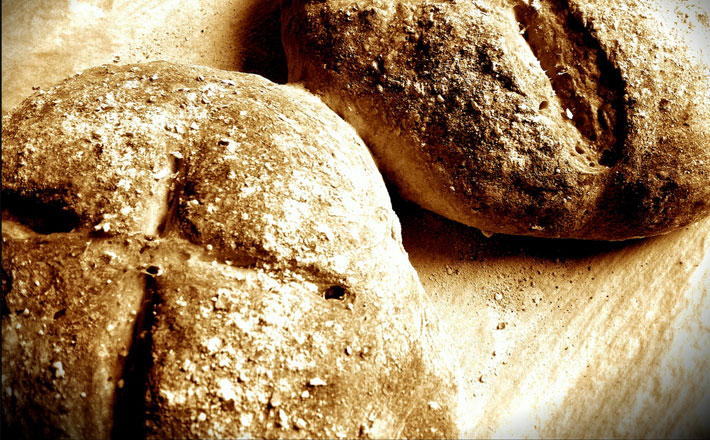Commentary on John 6:35, 41-51
Jesus is manna, that miraculous substance with which God cultivated relationship with Israel and sustained them in the wilderness.
John continues to interpret Jesus’ identity through the story of the manna, God’s miraculous bread from heaven. The crowd introduced the story by quoting the scripture, “he gave them bread from heaven to eat” (John 6:31). Jesus interprets this scripture verse throughout verses 32-58. Although the crowd was initially receptive to the idea that Jesus could provide them with manna (verse 34), he goes on to indicate that he is the manna.
In the first “I am” statement of John’s Gospel (compare with John 8:12; 10:7; 10:11; 11:25; 14:6; 15:5) Jesus states that he is the “bread of life” (John 6:35). Both this phrase and the phrase “bread from heaven” were references to the story of the manna. Jesus’ initial statement in verse 35 associates him with the life-giving power of the manna. In the wilderness, the Israelites had neither food nor drink and would have died without God’s provision. So also Jesus has just provided miraculous food for 5,000 people (John 6:1-14).
Also like the manna story, Jesus is not only talking about the relief of literal hunger. The manna story is a story about trust in God. God saved Israel from slavery in Egypt through the waters of the Red Sea (Exodus 14-15). But once in the desert, Israel did not trust God to provide for them. Even so, God provided both food and water throughout their forty years (Exodus 16:35).
Just as the Israelites complained to Moses, so also the Jews complain about Jesus. The word “complain” (John 6:41, Greek: gonguzo) is a cognate of words used in the Septuagint to describe Israel’s grumbling against God and Moses (for example Exodus 16:2, 7, diagonguzo; Exodus 16:7-9, gonguzmos). This theme continues in John 6:52 and John 6:61. The grumbling of the crowd characterizes them as the Israelites in the Exodus story. They have experienced God’s salvation and yet do not fully trust in God.
Manna had to be collected according to the instructions God gave (Exodus 16:16-26), and therefore was a training ground for learning to trust God’s word. Deuteronomy summarizes the story this way: “Remember the long way that the Lord your God has led you these forty years in the wilderness, in order to humble you, testing you to know what was in your heart, whether or not you would keep his commandments. He humbled you by letting you hunger, then by feeding you with manna, with which neither you not your ancestors were acquainted, in order to make you understand that one does not live by bread alone, but by every word that comes from the mouth of the Lord” (Deuteronomy 8:2-3). The memory of the manna story was not simply that God fed Israel, but that eating manna was akin to learning God’s wisdom and abiding by God’s law (compare with Psalm 78: 11-25; Wisdom 16:21-29).
The Greek word pisteuo, which is translated “believe” throughout John, was more commonly used to convey a trusting relationship. Thus, even though John is concerned that readers understand that Jesus is who he claims to be, pisteuo might better be translated as “trust” in these verses. John emphasizes throughout the Gospel that the audience should trust the witnesses to Jesus, along with Jesus’ own words and signs, and through these things come to trust in Jesus.
In a similar way, God gave Moses signs to perform so that the people would trust or believe that God sent Moses to them (see Exodus 4:1-9). God’s salvation of Israel resulted in their trust (Exodus 14:31), but the question of Israel’s on-going trust that God was with them animates the wilderness stories (for example Numbers 14:11; 20:12). This sense of the word pisteuo is surely in play in John 6:35, 47. The one who trusts in Jesus feeds on the bread of life. Like the manna, trust is required to access the life Jesus offers.
The gift of manna in Exodus is intertwined with God’s commands.
Moses said to them “It is the bread that the Lord has given you to eat. This is what the Lord has commanded: ‘Gather as much of it as each of you needs, an omer to a person according to the number of persons, all providing for those in their own tents’” (Exodus 16:15-16).
Those who did not gather the manna as instructed saw the extra manna rot, or they found that none was available to gather on the sabbath (Exodus 16:20, 27). Living by manna meant living by God’s word.
The bread Jesus provides is similar. “Everyone who has heard and learned from the Father comes to me” (John 6:45). That is, not anyone can eat of the manna, but only those who followed the instructions of God. Since the opening verses, John has been associating Jesus with God’s word or wisdom, and the manna metaphor continues that important idea and extends it in a new way. Jesus the word is life-giving in the same concrete ways that the manna was. He communicates God’s will and through that word, cultivates a relationship of trust between human and divine.
Jesus suggests that he is different from the manna in one way. The ancestors died in the wilderness, but the one who eats Jesus’ bread “does not die” (John 6:50). This is not a criticism of the manna. The death of Moses and the first generation was a well-known part of the Exodus story, resulting from Israel’s idolatry. Jesus as manna offers to overcome that part of the story. Those who come to Jesus have learned from the Father. They are followers of God’s word who are promised a life-giving relationship that endures.
John’s characterization of Jesus as manna in these verses may convey a message similar to that of Psalm 1. Those who delight in God’s law “are like trees planted by streams of water, which yield their fruit in its season, and their leaves do not wither. In all that they do, they prosper” (Psalm 1:3). Both writers convey the deep and sustaining connection that comes from learning and following God’s word.


August 12, 2018